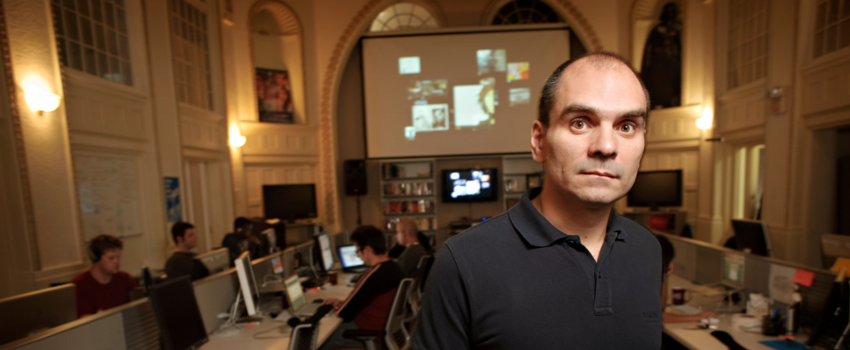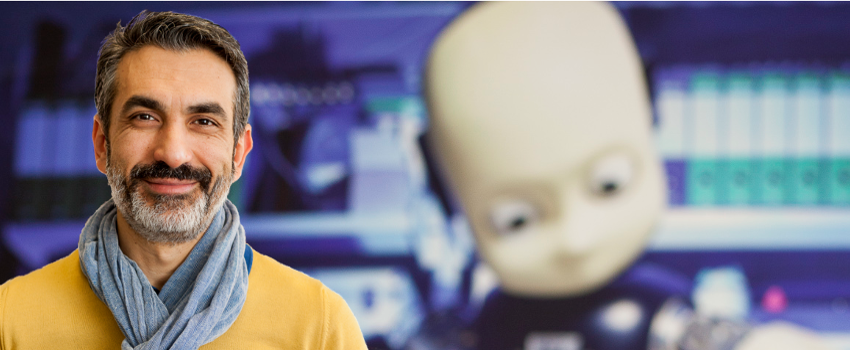
14:30 - 15:00 Registration
15:00 - 15:30 Opening of the CCIA 2015
15:30 - 16:30 Session 1: Modelling
- Proprioceptive Feedback and Intrinsic Motivations in Early-Vocal Development.
Juan Manuel Acevedo Valle, Cecilio Angulo, Núria Agell and Clement Moulin-Frier - Agent-based agreement over concept meaning using contrast sets.
Kemo Adrian and Enric Plaza - Defining a Continuous Marketplace for the Trading and Distribution of Energy in the Smart Grid.
Jesús Cerquides, Gauthier Picard and Juan Antonio Rodríguez Aguilar
16:30 - 17:30 Coffee break and poster session
17:30 - 18:30 Session 2: Logics & semantics
- Averaged Similarities Generable by Single Attributes.
Dionís Boixader and Jordi Recasens - On Free Models for Fuzzy Horn Clauses.
Vicent Costa and Pilar Dellunde - A Simple Experiment to Guide the Design of a Preference Model.
Eva Armengol and Josep Puyol-Gruart
18:30 - 19:30 Awards ceremony
- Marc Esteva Vivanco Prize for the best doctoral tesis on AI
- ACIA Prize for the best BSc/MSc final project on AI
19:30 - 20:30 Invited talk: Prof. Carles Sierra
Ramon Llull: From the Ars Magna to Agreement Computing
20:30 - 23:00 Welcome cocktail

09:30 - 10:30 Invited talk: Dr. Francisco J. Martín
The Past, Present, and Future of Machine Learning APIs
10:30 - 11:00 Coffee break and poster session
11:00 - 12:00 Session 3: Decision support systems & data mining I
- Computing Distances between Decision Makers Using Hesitant Fuzzy Linguistic Term Set.
Núria Agell, Mónica Sánchez, Francesc Prats and Francisco Javier Ruiz - A Data Mining Methodology for Event Analysis in Neurophysiological Signal
Javier Bejar, Mario Martín, Genaro Esposito and Ulises Cortés - Evaluating Link Prediction on Large Graph.
Dario Garcia-Gasulla, Ulises Cortés, Eduard Ayguadé and Jesús Labarta
12:00 - 13:00 Session 4: Decision support systems & data mining II
- A Windowing based GPU optimized strategy for the induction of Decision Trees in JaCa-DDM.
Héctor Xavier Limón Riaño, Alejandro Guerra-Hernández, Nicandro Cruz-Ramírez, Héctor-Gabriel Acosta-Mesa and Francisco Grimaldo - Tweet-SCAN: An event discovery technique for geo-located Tweet.
Joan Capdevila, Jesús Cerquides, Jordi Nin and Jordi Torres - Using Multi-Agent Systems to mediate in an assistive social network for elder population.
Cristian Barrué, Atia Cortés, Jonatan Moreno and Ulises Cortés
13:00 - 15:00 Lunch
15:00 - 15:15 Presentation of KTIA.cat
15:15 - 16:00 Pechakucha about ACIA Grants
16:00 - 17:30 Session 5: Classification
- Distance-based Kernels for Dynamical Movement Primitives.
Diego Escudero-Rodrigo and René Alquezar - Using Kernel Alignment for Feature Selection in Schizophrenia Diagnostic.
Mario Martín, Javier Bejar, Gennaro Esposito, Neus Català, Ulises Cortés, Ferran Viñas, Josep Tarragó, Emilio Rojo and Rafal Nowak - Boosting Classification Based Similarity Learning by using Standard Distances.
Emilia López-Iñesta, Miguel Arevalillo-Herráez and Francisco Grimaldo - On the Classification of Industrial SAT Familie. Carlos Ansótegui,
Maria Luisa Bonet, Jesus Giráldez-Crú and Jordi Levy - Speeding Up Neural Networks for Large Scale Classification using WTA Hashing.
Amir Hossein Bakhtiary Davijani, Agata Lapedriza and David Masip
17:30 - 18:00 Coffee break and poster session
18:00 - 19:00 ACIA general meeting
20:30 - 21:45 Walk around modernist Valencia
21:45 - 23:45 Gala dinner
- CCIA 2015 Prize for the best paper and poster
- ACIA Prize for the best work on popularization of AI

09:30 - 10:30 Invited talk: Prof. Giorgio Metta
iCub: an open platform for research in robotics & artificial intelligence
10:30 - 11:00 Coffee break and poster session
11:00 - 12:20 Session 7: Machine learning
- Identifying nutritional patterns through Integrative Multiview Clustering.
Karina Gibert, Miquel Sànchez-Marrè and Beatriz Sevilla - On the Use of User-generated Content in Critiquing Recommendation.
David Contreras and Maria Salamo - Domain adaptation problem in stadistical machine translation.
Mara Chinea-Rio - Fuzzy microaggregation using FCM.
Vicenç Torra
12:20 - 13:20 Session 8: Image analysis
- Guessing Art Styles using Qualitative Colour Descriptors, SVMs and Logics.
Zoe Falomir, Lledó Museros, Ismael Sanz and Luis González-Abril - Analysis of the evolution of breast tumours using strain tensors.
Mohamed Abdel-Nasser, Antonio Moreno and Domènec Puig - Automatic Recognition of Molecular Subtypes of Breast Cancer in X-Ray images using Segmentation-based Fractal Texture Analysis.
Jordina Torrents Barrena, Aïda Valls Mateu, Petia Radeva, Meritxell Arenas Prats and Domènec Puig.
13:20 - 13:45 Closure of the CCIA 2015
13:45 - 16:30 Lunch
16:30 - 17:00 Bus to the train stations

Ramon Llull: From the Ars Magna to Agreement Computing
Prof. Carles Sierra
The philosopher Ramon Llull (1212-1316) proposed the Lullian Art, an argumentative method to convince non-Christians about the truth of the Christian faith. Although the purpose of his method is obviously futile, Llull made a seminal contribution to one of nowadays most exciting areas of research in Multiagent Systems: Agreement Computing. He proposed a basic alphabet, (extended later by Leibniz using numbers), which, by means of combinations, would build a consistent vision of the world that everybody should agree upon. In this talk I will describe Llull’s contribution to logic, argumentation and social choice and the current research trends in Agreement Computing. In particular, I will survey the areas of Negotiation, Argumentation and Regulation, and, when possible, I will relate them to Llull’s vision.

The Past, Present, and Future of Machine Learning APIs
Dr. Francisco J. Martín
In the past years, Machine Learning has been getting attention as a necessary tool for doing something useful with the ever-growing volume of data. This misleads some to believe that Machine Learning is new, but the truth is that the core algorithms and concepts have been around for a long time. What is new though is the confluence of Machine Learning and Cloud Computing, which for the first time in history is making learning from large datasets possible thru the use of programmable APIs. Since 2011, BigML has worked to implement this vision of a programmable web powered by a seamless Machine Learning layer in the cloud which will enable future smart apps to adapt themselves to a changing context in real-time as new information arrives. In this presentation we will trace the history of Machine Learning from it’s origins to the present and discuss the future evolution that must occur in terms of simplicity, programmability, importability/exportability, composability, specialization and standardization in order for it to make an impact in the "real world" and make this vision come alive.

iCub: an open platform for research in robotics & artificial intelligence
Prof. Giorgio Metta
Giorgio Metta will present the iCub humanoid, a robotic platform designed for research in embodied cognition. At 104 cm tall, the iCub has the size of a three and half years old child. It can crawl on all fours and sit up to manipulate objects. Its hands have been designed to support sophisticate manipulation skills. The iCub is distributed as Open Source following the GPL/FDL licenses and can now count on a worldwide community of enthusiastic developers. The entire design is available for download from the project homepage and repository (http://www.iCub.org). About 25 robots have been built so far which are available in laboratories in Europe, the USA and Japan. It is one of the few platforms in the world with a sensitive full-body skin to deal with the physical interaction with the environment including possible people.

